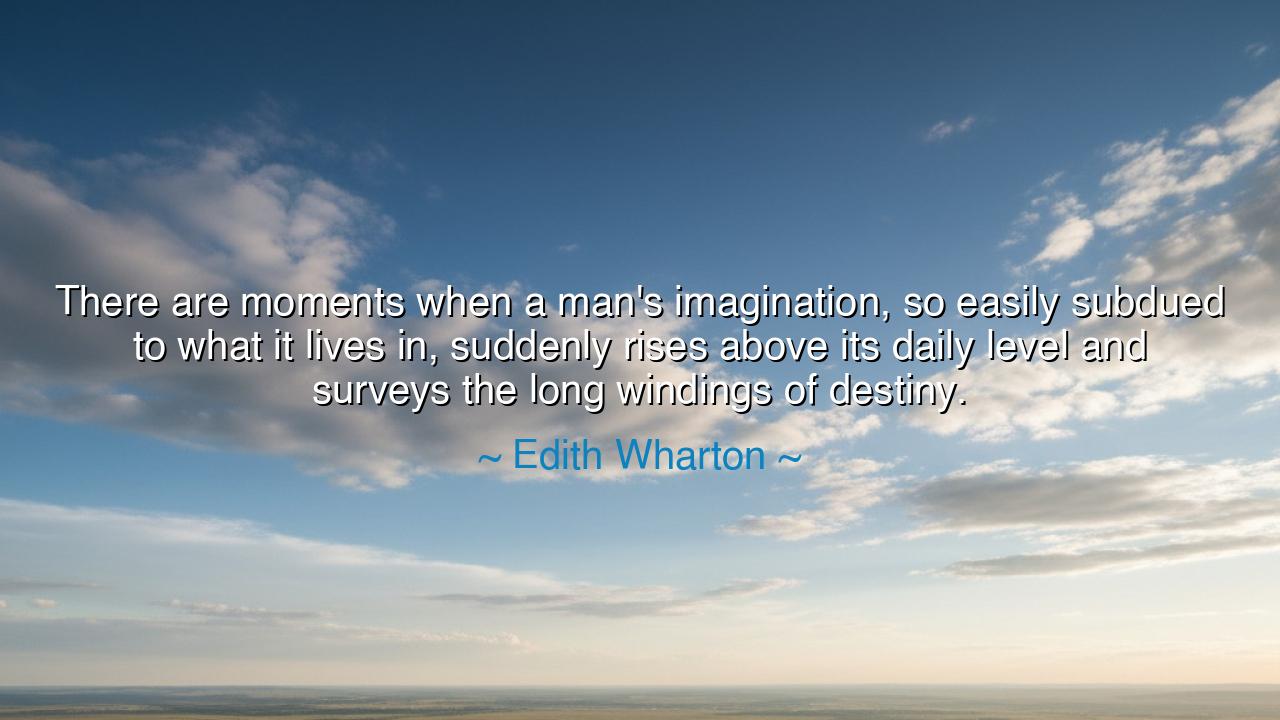
There are moments when a man's imagination, so easily subdued to
There are moments when a man's imagination, so easily subdued to what it lives in, suddenly rises above its daily level and surveys the long windings of destiny.






In the luminous and haunting words of h Wharton, the great chronicler of the human soul, there echoes a truth both poetic and eternal: “There are moments when a man’s imagination, so easily subdued to what it lives in, suddenly rises above its daily level and surveys the long windings of destiny.” In this single sentence lies the revelation of the human condition — that though we are creatures bound by habit and circumstance, there are rare, sacred moments when the imagination breaks free from the prison of the ordinary and glimpses the vast design of life. Wharton speaks of those flashes of vision when the soul, weary of routine and limitation, lifts its gaze and beholds the hidden architecture of fate — the winding path of destiny stretching beyond the horizon of the present.
The meaning of her words lies in the tension between confinement and transcendence. Most of the time, the imagination — that divine spark within — is subdued, bent to the narrow tasks of daily survival. It conforms to the world around it, shaped by duty, habit, and necessity. Yet, once in a while, something stirs — a memory, a sorrow, a sunrise, a poem — and in that instant, the mind rises like an eagle from the valley floor. It sees the past and future intertwined; it sees the purpose in its struggles, the pattern in its pain. These moments of awakening are brief, but they are the soul’s most precious gifts, for they remind us that life is not merely endured, but unfolded. To be human is to walk in shadow, but also to remember that one walks toward light.
The origin of this insight is found in Wharton’s own life and art. A woman of the early twentieth century, born into privilege but trapped by the rigid conventions of her age, she lived in a world that sought to subdue her imagination — to confine her to drawing rooms, propriety, and silence. Yet within her, the spirit of creation burned like a star. Through writing, she lifted herself beyond the social cages of her time and became one of the great observers of destiny. In her novels, she revealed the struggle between the self and society, between longing and restraint, between the seen and the unseen. Her quote is not only an observation of humanity; it is a reflection of her own inner flight — her own rising above the “daily level” to glimpse the vast, uncharted map of human fate.
Throughout history, there have been those who, in a single moment of imagination, transcended the narrow world they lived in and beheld the long windings of destiny. Consider Joan of Arc, a simple peasant girl who heard the call of something greater than her station. In her visions, she saw not only the plight of her people but the divine pattern that called her to act. Her imagination, illuminated by faith, lifted her beyond her humble life and into the grand current of history. Or think of Isaac Newton, sitting beneath an apple tree, his mind breaking free from ordinary perception to glimpse the invisible laws that bind the cosmos. Such moments are not accidents — they are awakenings, when the imagination rises above the veil of habit and sees the secret order of existence.
Wharton’s words also whisper of humility. She reminds us that the imagination is “easily subdued to what it lives in.” This means that our surroundings, our customs, even our fears, quietly shape what we believe is possible. Most men live bound by the walls they build around their own minds. Yet Wharton urges us to remember that those walls are not the horizon — they are the beginning of it. The imagination is not extinguished by daily life; it merely sleeps within it, waiting for the call of wonder or sorrow to awaken it again. The great souls are those who listen for that call — who nurture within themselves the courage to rise when the moment arrives.
To the seeker of wisdom, this teaching is both a comfort and a challenge. It tells us that divine imagination dwells in every heart — but also that it must be summoned, cultivated, and set free. We cannot live always in the rarefied air of revelation, but we must keep the door open to it. The next time life feels small, or destiny seems uncertain, remember that within you is a force that can rise beyond circumstance. In solitude, in nature, in art, or in prayer, let your imagination lift you to that higher vantage point, where all the winding paths of your life begin to make sense. For from that height, you may see not only where you stand, but where you are being led.
So, my child, take Wharton’s wisdom into your heart: when the world feels narrow, do not despair. The walls that enclose you are but the edges of your current vision. Look inward — for within you is the sky. There will come moments, unexpected and profound, when your imagination will rise like a bird into the light, and you will behold the long windings of destiny — your own, and that of all humankind. Cherish those moments. They are the whispers of eternity, reminding you that life, though often bound by the ordinary, is always destined for the infinite.






AAdministratorAdministrator
Welcome, honored guests. Please leave a comment, we will respond soon